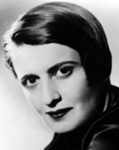Ayn Rand

Author, philosopher
Born: St. Petersburg - 2 February 1905
Died: New York - 6 March 1982
The controversial, enormously popular American novelist and founder of Objectivist philosophy Ayn Rand was born Alisa Zinovyevna Rosenbaum in St. Petersburg in February 1905, just as the revolution of that year was getting underway. Her father was a pharmacist who, despite the restrictions of an increasingly anti-semitic climate, became successful enough to buy the store he managed and the building in it, on the corner of Nevsky Prospekt and Ploshchad Vosstaniya. According to her later recollections, she was a solitary child who took to writing at a very young age, composing four novels by the time she was eleven.
The family's comfortable bourgeois existence came to an end with the October Revolution, when Rand witnessed Bolshevik soldiers seizing and looting her father's business. The family moved to Crimea, a White Russian stronghold, where Rand attended high school. The family returned to Petrograd in 1921, and Rand enrolled at Petrograd State University in the Department of Social Pedagogy. After graduating in 1924, she spent one year studying at the State Technicum of Photography and Cinema, where she wrote a monograph about the Polish actress Pola Negri that was her first work to be published.
In Autumn 1925, Rand was granted a US travel visa to visit relatives in Chicago. She soon moved to Hollywood where she spent several years trying to break into the movie industry as a screenwriter. Her first novel, the semi-autobiographical We The Living, was published in 1936. Considered by many her best literary work, it recounts the fates of a female engineering student and her two lovers, a former aristocrat and an idealistic Communist secret policeman, in post-Revolutionary Petrograd.
The Fountainhead (1943) and Atlas Shrugged (1957) made Rand a household name, and she spent the rest of her life writing non-fiction works promoting Objectivism, her philosophy espousing the "virtue of selfishness" that has become one of the intellectual bedrocks of modern American right-wing thought, with economist Alan Greenspan among her most famous disciples. She died in New York in 1982, but has once again become a major force in American public life with the rise of the Tea Party movement.
Despite Rand's best efforts, she was unable to help the rest of her family leave the Soviet Union, and her parents died during the Siege of Leningrad.
Works: We the Living (1936, Revised edition 1959)

